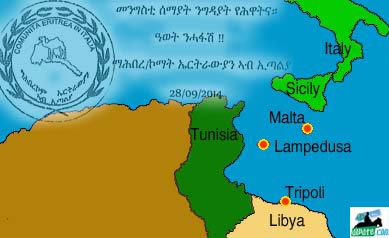Eritrean Strongman Isaias Afwerki: Still The Regional Spoiler
 The recent North African revolutions in Tunisia, Egypt and Libya may have temporarily put a pause on Isaias Afwerki’s preternaturally spoiler role in the region, but the strongman has not entirely curtailed his adventures.
The recent North African revolutions in Tunisia, Egypt and Libya may have temporarily put a pause on Isaias Afwerki’s preternaturally spoiler role in the region, but the strongman has not entirely curtailed his adventures.
In February 2011, Ethiopian prime minister Meles Zenawi accused Eritrea of sending militants from the port of Asseb to Ethiopia and told his parliament that the militants were captured by Ethiopian authorities in Bati, a town in the Afar region of Ethiopia.
On February 17, 2011, Djibouti’s defense minister, Ejre Kifleh Ahmed, accused Eritrea of sending militants carrying 200 explosives to his country and that the armed men were captured in Obock, near the Eritrean border.
On the same day, February 17, 2011, the Sudanese president Omar AlBashir visited Asmara for an emergency meeting with Isaias Afwerki and stayed for a few hours and returned home. The subject of the discussion, though not made public, deals with Sudanese rebels in Eastern Sudan and Darfur who rebel against Khartoum and are under the influence of Isaias Afwerki.
An expert at waging proxy wars, Isaias Afwerki had been allied to the now-deposed Hosni Mubarek on three issues: containing Ethiopia’s influence in Somalia; containing Ethiopia’s ambitions on the River Nile; and containing South Sudan’s autonomy.
With respect to Somalia, Isaias Afwerki had and still has one goal: to make any peace treaty hosted or supported by Ethiopia to be unworkable. A Somali government allied to Ethiopia is not seen as in the strategic interest of Egypt, and therefore, Eritrea. Towards that end, Isaias Afwerki has demonstrated, even under the duress of UN sanctions, that he would pull no punches to train, arm or fund anyone who can disrupt the Djibouti Agreement.
With respect to Sudan, Mubarek and Isaias were the only two leaders who pushed hard to delay the Southern Sudan referendum that was carried out last January. But when the entire world supported it and it appeared inevitable, Mubarek and Isaias decided to play along and had a plan—delay its implementation which is planned for the coming summer, by creating as many roadblocks and thorns as possible.
Meanwhile, in Western Sudan, Moammer Gaddaffi has been funding Isaias Afwerki and Chad’s Idris Deby (both are supporting Gaddafi against the Libyan rebels) to train and arm the Darfurians. Even now, a large contingent of Darfurians and South Sudanese rebels opposed to the government of Southern Sudan—forces loyal to General George Athor—are being trained in Western Eritrea by Brigadier General Tekle Manjus. Also heavily involved in this adventure was Omar Suleiman, the Egyptian intelligence chief who served as Mubarak’s vice president for about week.
Perhaps owing to Ethiopia’s long solidarity with them—going back to the Haile Selasse and Mengistu eras—the new Southern Sudanese government has been partnering with Ethiopian nationals and the Ethiopian government, a development that has irked Isaias Afwerki who had also supported the South People’s Liberation Movement (SPLM) for decades. For losing that opportunity, Isaias will not waver to ignite crisis for Southern Sudan.
Meanwhile, earlier this year, Brigadier General Tekle Manjus, in a break with established policy, openly encouraged the Eastern Sudan Front to demand the right to self-determination. This is a surprising development considering that the Isaias regime vested a great deal of time and resource to broker a peace deal between Sudan’s Eastern Front and the Khartoum government.


Awate Forum